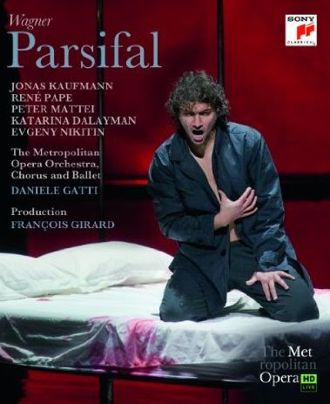 In
some respects this is a traditional Parsifal, with spears, a
chalice, a grave for Titurel, a bed for Kundry’s attempted
seduction of the hero. But producer François Girard places such
details in a postmodern context. First he launches the drama as
if it were a rehearsal rather than the real thing, with
Gurnemanz and the knights in white shirts and slacks. Then he
downplays aspects that could be more naturalistic – like the
pastoral idyll of the Good Friday scene – while exaggerating
elements which Wagner himself presented with relative restraint;
the flowing and staining effects of blood in Act 2, for example. In
some respects this is a traditional Parsifal, with spears, a
chalice, a grave for Titurel, a bed for Kundry’s attempted
seduction of the hero. But producer François Girard places such
details in a postmodern context. First he launches the drama as
if it were a rehearsal rather than the real thing, with
Gurnemanz and the knights in white shirts and slacks. Then he
downplays aspects that could be more naturalistic – like the
pastoral idyll of the Good Friday scene – while exaggerating
elements which Wagner himself presented with relative restraint;
the flowing and staining effects of blood in Act 2, for example.
Significant details are inevitably lost when a darkly lit
production using the full dimensions of the Metropolitan Opera
stage is viewed on a small screen. I was impressed by the
austere grandeur of some episodes, alienated by the abstractions
elsewhere – especially in the ceremonial scenes that end Acts 1
and 3, where the vagueness of the terrain risks neutralising the
impact of the enacted rituals, with their focus on Amfortas’s
physical agonies. This uneasy mix – reinforcing the obvious
while side-stepping certain essentials – also transfers to the
musical dimension.
Daniele Gatti has sometimes been
accused of failing to access the proper pace and inner life of
Wagner’s score; his laborious slowing down for the Act 1
transition music illustrates the problem. But there are
compensations. The orchestral sound is consistently rich and
resonant, and the singing is – without exception – mesmerisingly
in tune with the production’s highly stylised ritualism. The
impassioned intensity Jonas Kaufmann brings to Parsifal’s music
is matched by the rhetorical conviction of Peter Mattei’s
Amfortas and Evgeny Nikitin’s Klingsor, and complemented by the
warmer qualities of Katarina Dalayman’s Kundry and René Pape’s
Gurnemanz. Nevertheless, it is as if the opera’s much-vaunted
notions of compassion and redemption are being coolly appraised
rather than vigorously affirmed or contradicted. This is very
much Wagner for the 21st century.
|